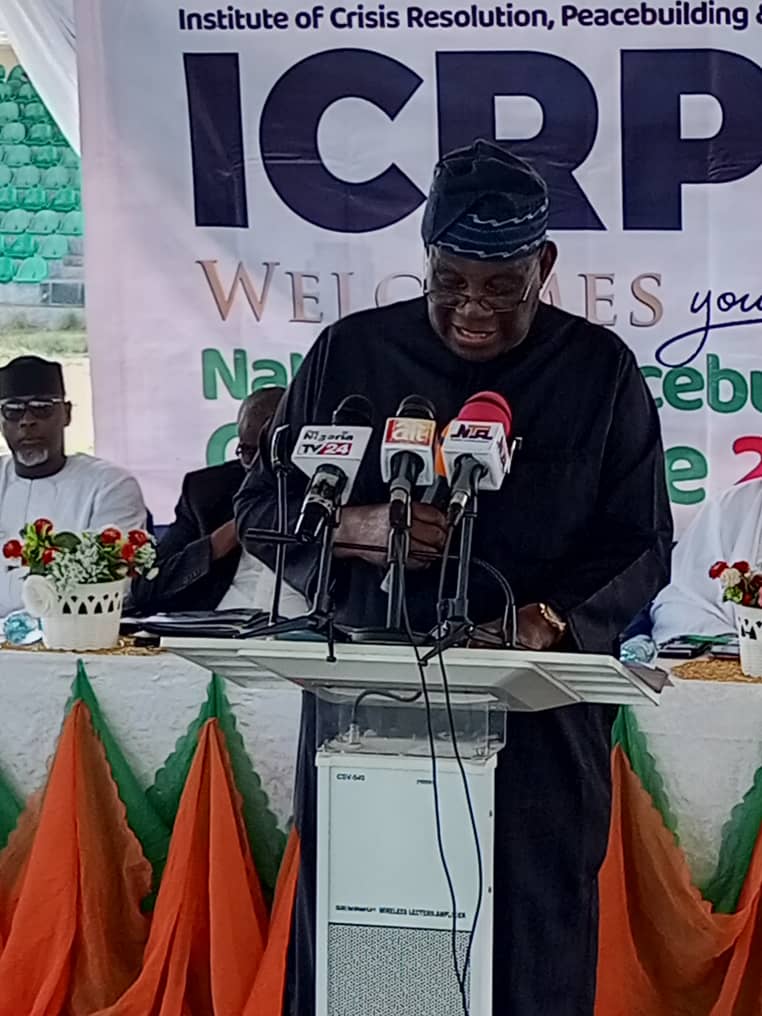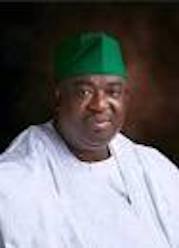NEWS
Stakeholders Beg the Judiciary to Sustain Nigeria’s Democracy

Democracy stakeholders have appealed to the actors in the Nigerian Judiciary to uphold the rule of law and ensure justice in order to maintain Nigeria’s hard-earned democracy.
Speaking recently at a conference organized by the Institute for Crisis Resolution, Peacebuilding, and Conciliation (ICRCP) in collaboration with the National Open University of Nigeria (NOUN) Jabi, the stakeholders emphasized that only by strictly adhering to democratic principles could the developmental aspirations of all Nigerians be achieved.
According to retired Major General Lawrence Onoja, who served as the Military Administrator of Plateau and Katsina States, democracy serves as a permit to access international diplomacy, finance, trade, investment, sports, entertainment, tourism, humanitarianism, defense, and security on a global scale.
Furthermore, he urged political leaders in the country to promote an electoral process that is credible and transparent, ensuring the active involvement of citizens in the governance of their affairs.
“As countries rush to achieve the label of being democratic, Nigeria should differentiate its version of democracy by upholding critical democratic principles such as the rule of law and justice. This includes respecting human rights, providing welfare and security for its citizens, fostering transparency and accountability, promoting open government, encouraging citizen participation, and embracing inclusiveness.
“It is therefore essential that political leaders encourage, adopt, accept, and celebrate transparent, credible, and open electoral processes as a crucial commitment to national security. This serves as the minimum standard to ensure the equal participation of Nigerians in the governance of their affairs,” stated Onoja.
Furthermore, He stated that the electoral process is incredibly important and central to democracy, governance, security, and conflict resolution; adding that the reason courts are used in resolving conflicts is due to the absence of democratic governance and the privileges it entails.
Onoja emphasized that as Nigerians continue to strive for a functional government that can ensure food security, health security, community security, economic security, political security, environmental security, and personal security, it is crucial for relevant state institutions to operate effectively.
“While the voting and declaration of winners in the 2023 general elections have concluded, there are still election conflicts pending before the courts,” Onoja remarked.
He regarded the 2023 general election as a defining moment for Nigeria, given the numerous threats to peace, security, and development that the nation faced on the eve of the election. He commended President Tinubu, Atiku Abubakar of the PDP, and Peter Obi of the Labour Party for choosing the path of peace.
However, he called upon the judiciary to remain firm and diligently fulfill their duties in litigations, based on evidence, to enhance citizens’ trust in the government and garner their support in collectively combating common enemies of the country.
“We are confident that the judiciary will carry out its duty commendably in resolving all electoral conflicts. This will instill citizens’ confidence in the electoral body, the electoral process, democratic institutions, democracy itself, and the new administration that emerges from the electoral process. The credibility of the conflict resolution process will also serve as a unifying force for all Nigerians to join the government in the fight against threats to peace and security, particularly terrorism, insurgency, separatist agitation, militancy, banditry, and other criminal activities. It will also diminish divisive voices and strengthen the voices of national unity.”
Also speaking, The Director-General of ICRPC, Prof. Andrew Zamani, stated that as a professional group and major stakeholders in the Nigeria Project, it is essential to examine the electoral processes in Nigeria since independence. This examination aims to identify both the best practices and flaws in elections in order to strengthen the country’s democracy.
Zamani emphasized that electoral processes reflect our collective attitudes towards power, justice, and equity. Therefore, it is crucial for the conference to broaden its focus beyond elections managed by INEC and Independent State Electoral Commission to include party governance and democracy. It is important to investigate the influences of patriarchy, godfatherism, financial factors, and familial biases on party governance and the process of selecting leaders in the country. Additionally, the role of the judiciary and extrajudicial factors in resolving conflicts arising from contentious election results should be examined. These discoveries should not be disconnected from the overall state of the rule of law in Nigeria.
Zamani expressed that Nigeria’s growth as an economic powerhouse in Africa relies on having strong institutions capable of ensuring a functioning electoral process. He emphasized the need for transparency in the electoral process, which reflects the people’s choice and guarantees the legitimacy of the government formed through such elections.
Dr. Abdulwaheed Odewale, the Register-General of ICRPC, described the conference as a dynamic platform for diverse voices working towards a peaceful and democratic society where the ballot triumphs over violence. Odewale stated that the knowledge and experiences shared during the conference would shape policies and practices guiding the future of Nigeria. The conference delved into the complexities of the electoral process, recognizing its pivotal role in upholding democracy and ensuring the collective will of the people. Discussions on security challenges deepened the understanding of the crucial need for a safe and stable environment that encourages citizens’ participation.
Odewale encouraged conference participants to embody the spirit of unity, resilience, and determination, applying the knowledge gained to become catalysts for positive change and improved approaches to elections in Nigeria. Upholding the principles of fairness, transparency, and non-violence is our collective responsibility to ensure the thriving and flourishing of our democracy. Odewale expressed confidence that the insights from the conference would resonate across the nation, inspiring active contributions to the peaceful coexistence and progress of Nigeria. Together, we can build a future where the ballot box prevails, where every voice is heard, and where conflict gives way to reconciliation.
NEWS
Eight Students Die, Three Injure in Jos Road Crash

From Jude Dangwam, Jos
The Vice Chancellor of the University of Jos, Prof. Ishaya Tanko has confirmed the sad death of 8 students of the University to a road crash involving their Toyota bus with a truck in the metropolitan city of Jos.
He disclosed that one of the students was being prepared for surgery in the early hours of Thursday at the Jos University Teaching Hospital while others were receiving medication at the Bingham Teaching Hospital.
The Federal Road Safety Corps (FRSC) Plateau State Command disclosed that the accident occurred opposite Unity Bank Zaria Road, Jos, at around 2:30 am.
The Plateau State Sector Commander of the Corps, Olajide Mogaji explained that seven people lost their lives on the spot, while another victim died in hospital, bringing the total number of fatalities to eight.
According to the Command’s statement, the crash involved a trailer and a bus, which was carrying eleven passengers, all male students of the University of Jos, opposite Unity Bank Zaria Road, Jos, at around 2:30 am.
Mogaji said eyewitness accounts revealed to the corps emergency teams that the bus was speeding and engaged in wrongful overtaking, leading to the loss of control and the crash.
The Sector Commander has appealed to drivers to avoid night trips, excessive speed, and dangerous driving, saying, “The government needs you alive, and wants you to live life to the fullest in this festive season and beyond.”
The FRSC noted that the incident is still under investigation, while urging the public to report crashes or road emergencies to their toll-free emergency number 122 at all times for prompt responses.
The victims were said to have been coming back from a welcome special party for new students when the unfortunate incident occurred with the vehicle carrying the male students while the other vehicle carrying the female students escaped the tragedy.

UNICEF Hails Bayelsa as Champion of Primary Healthcare Devt in Nigeria
From Mike Tayese, Yenagoa
The United Nations Children’s Fund (UNICEF) has commended the Bayelsa State Government for its deliberate efforts at improving primary healthcare delivery, especially in the area of immunization in recent years.
The Country Representative of UNICEF in Nigeria, Wafaa Saeed, gave the commendation, on Wednesday, when she led a delegation on a courtesy visit to Government House, Yenagoa.
Saeed said what she saw during her visit to some health facilities and her random interactions with some mothers in the state, corroborated the positive reports UNICEF has been receiving about Bayelsa in terms of immunization.
The special UN envoy, who described Bayelsa as champion of healthcare delivery and a shining spot in the country, noted that the state has achieved an impressive performance in its immunization indices from 2021 to date.
She attributed the improvement in the health indicators of the state to purposeful leadership, commitment and accountability being provided by the present administration.
While assuring the Bayelsa of UNICEF’s readiness for collaboration to improve nutrition for children as well as unlock resources for healthcare development in the state, the Country Rep, however, urged the Governor Douye Diri-led administration to sustain its efforts in the health sector.
She said, “We are really impressed with what Bayelsa is doing… Bayelsa State has also committed its financing of immunization campaigns from the state budget, and a special one (immunization) in-between.
“Also there is a monthly allowance and support you have continued to give from GAVI. These are some of the things that have really increased the number of immunized children and improved the performance of the state.
“In 2021, the number of children not immunized in Bayelsa was 71 percent; that means seven out of ten kids were not immunized. But between then and now, there is a big difference due to the leadership, commitment and accountability we are seeing in Bayelsa State.
“You have been a champion of primary healthcare and a champion of immunization. And I really look to have Bayelsa not only a champion of states in Nigeria but in our continent and the globe.”
In a response, Governor Douye Diri represented by his deputy, Senator Lawrence Ewhrudjakpo, reaffirmed the determination of his administration to prioritize investments in the health sector.
He said plans were underway to review the state primary healthcare board law with a view to not only sustaining the extant primary healthcare funding model but also expanding it through effective private sector contributions, especially from corporate organizations operating in the state.
Diri thanked the Country Rep, Ms Wafaa Saeed, for her kind words of encouragement and also acknowledged the support of UNICEF, WHO, Bill Gate, Dangote Foundation and other development partners, noting that Bayelsa could not have recorded its present achievements in the health sector without their collaboration.
His words: “We also want to thank you profusely for supporting our programme. We thank UNICEF, the WHO, Bill Gate Foundation, Dangote Foundation and others for your support. We really appreciate what you have done for our state.
“As a government, we know where we are going. A man who knows where he is going cannot be misled. We are focused and will continue to redouble our efforts in the health sector.
“You talked about sustainability. That is very important to us, and so, we are looking at the principal law, which is the Primary Healthcare Development Board Law. We are looking at some areas of that law to bind the hands of whoever that comes after us.
“That is to ensure that even if the administration after us will not have the motivation and passion to provide leadership for primary healthcare like the present governor is doing, the law will compel them to do so.”
The UNICEF Country Representative was accompanied on the visit by the Chief of Field Service, Judith Leville, UNICEF Health Consultant, Dr. Makio Perekeme, the Chief Field Officer, Anselm Audu and a health specialist, Eghe Abe, among others.

Mutfwang Pledges Support for Minister of Defence in Fight against Insecurity
From Jude Dangwam, Jos
Plateau State Governor, Caleb Mutfwang, has paid a courtesy visit to the newly appointed Minister of Defence, Gen. Christopher Gwabin Musa (Rtd), assuring him of his total and unwavering support in the collective effort to defeat insecurity in Plateau State and across Nigeria.
The Director of Press and Public Affairs to the Governor, Gyang Bere on Thursday disclosed that the Governor has expressed delight over Gen.
Musa’s appointment, describing it as a “strategic and timely decision” in confronting the country’s intricate and evolving security challenges.Mutfwang noted that the Minister’s vast experience and proven professionalism would significantly strengthen ongoing national security interventions.
“We must now focus on finding solutions to the challenges confronting us. Whatever has happened in the past should not deter us. The time has come for all of us to join hands and holistically address our security concerns,” Mutfwang emphasized.
The Governor reiterated his support for the establishment of State Police, acknowledging concerns about possible abuses, but stressing that the nation must collectively develop safeguards and ensure operational efficiency.
Gen. Christopher Musa expressed gratitude for the Governor’s visit, assuring him of a robust and productive collaboration in addressing security concerns in Plateau State and the country at large.
He commended Governor Mutfwang for hosting the Plateau Unity Christmas Carols and Praise Festival, describing it as a unifying initiative.






























